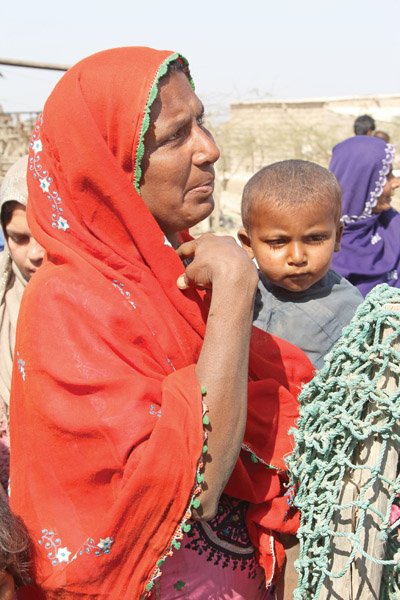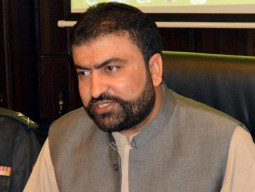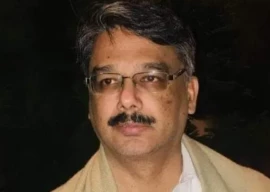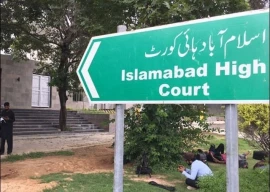
"These men were the only bread-earners for most of the women and children here," explains Rukiyat, whose sons Saddam, Nazeer and Mohmand are imprisoned across the border. Holding photographs of two of her three sons, the elderly woman says that her husband had become too old to earn a living, leaving it up to the imprisoned men to feed the family.

Indian and Pakistani men fishing in the Arabian Sea are often arrested for crossing into the waters of the other country, ending up in jail for years. Haji Yusuf Katiyar village is home to some of the highest numbers of imprisoned Pakistani fishermen - around 45 fishermen from the village are languishing in the jails of Gujarat, India. According to the Pakistan Fisherfolk Forum (PFF), there are currently a total of 248 Pakistani fishermen in Indian prisons.
"Now my grandchildren sell wood to scrape together enough money for food," says Rukiyat. "They work all day and earn only Rs200. Sometimes we eat tomato chutney with roti. Other times, we go to sleep with empty stomachs."
The poverty-stricken village of 1,000 residents is made up of small huts, built with wood and clay. There is no gas, water or electricity. The only thing in abundance there is heartbreaking stories - every other woman has a tale of imprisoned relatives, no support and no money. The women do not have the skills to make a living; fishing is the only mode of survival.
The imprisoned men are not the only ones they mourn for - some women also lost children who went out to fish with the men and were caught.
Sakina awaits the return of her husband, Muhammad Ameen, and 11-year-old son Ali Hasan. They were on separate boats but were arrested by the Indian authorities at the same time. As her younger, barefooted children cling to her, she vows to keep them with her. "I won't send him to the sea for fishing," she points to her 10-year-old son. "I fear he may be caught too."
With the help of local organisations in both the countries, the women now find out about the arrests of the men 15 to 20 days after the incident - an improvement, since they earlier had no choice but to think that they had died. There is still, however, no communication with the prisoners.

Abdul Sattar, who has been fishing since he was a teenager, says that the fishermen go out to the sea on eight to 10 day trips, earning a meagre Rs1,000 to Rs2,000. "People here are very poor and though they want to help each other, they usually don't even have enough to feed their own families," he explains.
"While the fishermen often do not realise they've entered Indian waters, the Indian authorities also sometimes capture them in Pakistani waters," Sattar adds, talking about how the men find themselves captive.
PFF chairperson Muhammad Ali Shah has proposed a solution to the problem - a buffer zone of 200 nautical miles. For the time being, however, the villagers see no end to these arrests and imprisonments.
Muhammad Siddique, a fisherman who was arrested in 2008 and released in 2010, now waits for the return of his two brothers. "We have no choice but to go out and fish. While I don't go far now, my brothers were captured in Pakistani waters. What can we do?"
Published in The Express Tribune, February 17th, 2015.
1727686587-0/Tribune-Pic-(11)1727686587-0-405x300.webp)
1727685355-0/BeFunky-collage-(21)1727685355-0-165x106.webp)

1727684365-0/Tribune-Pic-(10)1727684365-0-165x106.webp)
1727684930-0/lana-(1)1727684930-0-165x106.webp)



1724268870-0/Supreme-Court-of-Pakistan-(2)1724268870-0-270x192.webp)







1727268465-0/Untitled-design-(42)1727268465-0-270x192.webp)
COMMENTS (2)
Comments are moderated and generally will be posted if they are on-topic and not abusive.
For more information, please see our Comments FAQ